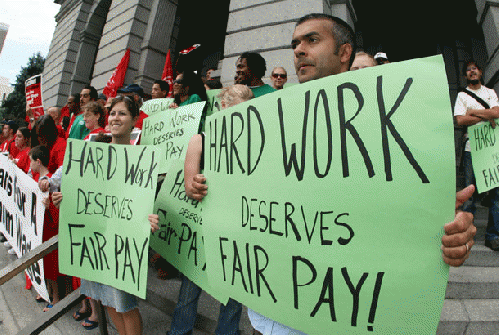Source: Paul Craig Roberts
Some years ago when I was Business Week's columnist, an up-and-coming academic economist published his conclusions that raising the minimum wage did not cause unemployment. An implication was that labor unions did not cause unemployment by forcing up wages.
These conclusions flew in the face of economic theory. Theory held that employees were paid the value of their marginal product. The value of the marginal product of labor is a measure of labor's contribution to the firm's revenues. As a factory, for example, increases its work force, after initially rising the contribution of each additional employee to output falls. Think of it in this way. As the work force expands, the fixed size of the factory means that additional workers have less technology and capital per capita with which to work.
Thus, after some point, the marginal product of additional workers falls. The value of the worker's marginal product is his output times the price of the product.
Translated that means that employers expand the work force to the point that the last person hired adds as much value to the firm's output as the cost of his wage.
Therefore, arbitrarily raising wages beyond this point by legislation or strikes would mean that the last employees hired cost more than they contribute to the value of the company's output. (The wage rises, but not the marginal product of labor). In other words, the work force would be downsized to the point that the value of the marginal product of the last unit of labor hired equaled the higher wage. Think of it this way. As the number of employees shrink, the capital and technology of the firm is spread among fewer workers, making them more productive.
I pounded the up-and-coming economist pretty hard for his conclusions. Having grown with age more skeptical of all explanations, today I probably would report his views, commend him for his courage in taking on established wisdom, and say that his findings should be examined for their correctness.
Like physics or chemistry or law or history or literature or whatever, there are far too many areas of economics for one economist to be informed about and to keep up with. I don't know whether the economist I took to the woodshed prevailed and changed the theory of wage determination or whether some fault was found in his work.
California entrepreneur Ron Unz has reopened the case for raising the minimum wage. Unz advocates for a $12 per hour minimum wage. Allowing for an eight-hour, five-day work week with two weeks vacation, this would produce an annual income of $24,000 -- the poverty level income for a family.
Unz has received more favorable attention than I gave the academic economist back in the 1980s or 1990s.
Unz makes a good case (see here for example). If Americans were paid a living wage for the jobs that Mexicans manage to do by living 10 to a trailer, illegal immigration would decline. Unz can convincingly argue that a higher minimum wage would actually increase the employment of American citizens as they would be able to scrape by on the wages from the higher minimum wage.
I endorse Unz's proposal with reservations. My doubts about a healthy rise in the minimum wage are not based on the economic theory that the value of the marginal product curve of labor is the firm's demand curve for labor. Nor am I opposed to a reduction of illegal immigration or to paying people a living wage. If the working poor made enough to live on, the social welfare budget could be cut.
From my standpoint, the problem with raising the minimum wage to a survivable level is that it pacifies the millions of Americans who are being oppressed by the greed of the one percent and the public officials who serve them. Making the survival of the oppressed easier keeps them from being in the streets protesting the rising inequality of income and wealth that jobs offshoring, financial deregulation, and cuts in social welfare programs such as food stamps have produced in America.
The ladders of upward mobility that made America an opportunity society have been dismantled by the movement abroad of America's high value-added, high productivity jobs, leaving displaced Americans with only lowly paid domestic service jobs, such as retail clerks, waitresses, bartenders, and hospital orderlies. Making low pay jobs more livable makes the dismantling of the opportunity society more acceptable.
I think that Unz is correct that a significant rise in the minimum wage would both reduce illegal immigration by making it possible for Americans to survive on minimum wage jobs and provide a poverty level income for millions of Americans who currently live below the poverty line. But this amelioration of hardship suppresses protests and rebellion.
To recover justice, a reasonable distribution of income, the accountability of government, corporations, and banksters to the rule of law, and to revive the growth of consumer demand on which the success of the US economy depends, the existing order that serves the one percent needs to be altered. The ladders of upward mobility must be restored.
What is more imperative, a rise in the minimum wage that pacifies the work force and the downtrodden by making their survival easier, or a rising swell of disaffection that ultimately reforms or overthrows a government that is unaccountable both to law and to the people?
(Note: You can view every article as one long page if you sign up as an Advocate Member, or higher).






